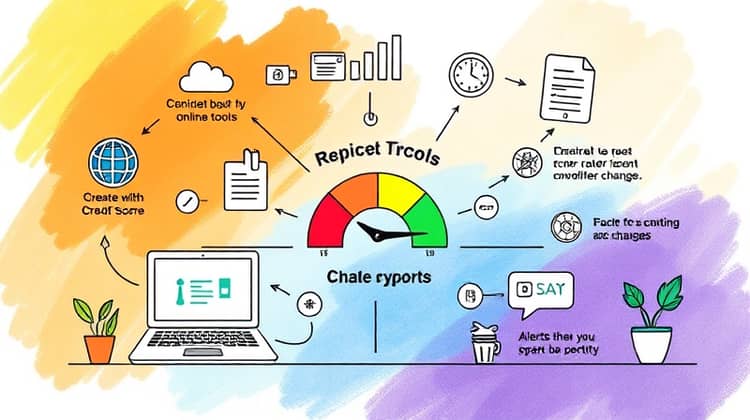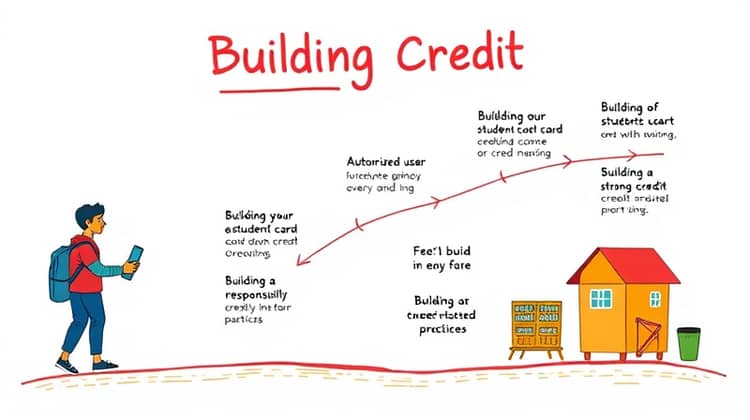Building credit as a student can be challenging, especially if you are just starting out on your financial journey. Establishing good credit is crucial, as it can open doors to various opportunities like renting apartments, buying a car, and even landing a job. Here are five easy ways to help you build and maintain a strong credit profile while you are still in school.
Each method presents a unique avenue for gaining experience with credit and learning how to manage your finances. Whether you opt for a student credit card or choose to become an authorized user, the key is to use credit responsibly and keep an eye on your financial habits.
Remember, building credit takes time and diligence, but with a proactive approach, you can set yourself up for financial success long after you graduate. Let's explore the steps you can take to build your credit wisely.
1. Get a Student Credit Card

One of the most straightforward ways for students to build credit is by applying for a student credit card. These cards are specifically designed for college students who may not have an established credit history. They often come with lower credit limits and more lenient approval criteria than traditional credit cards.
When choosing a student credit card, look for one that offers rewards, such as cash back on purchases or points for travel. These rewards can help you make the most of your spending while still maintaining a budget. Additionally, consider the card's fees and interest rates to ensure you are choosing a financially responsible option.
Once you have your card, use it for small, manageable purchases, and ensure that you can pay off the balance in full each month. This practice not only builds your credit but also instills responsible financial habits that will benefit you in the long run.
- Research different student credit cards and their benefits
- Choose a card that fits your needs and spending habits
- Apply for the card and make small purchases to start building credit
By following these steps, you can successfully attain a student credit card, which will serve as the foundation for your credit history.
2. Become an Authorized User

Another effective method for building credit is to become an authorized user on a family member's or friend's credit card. This arrangement allows you to benefit from their good credit history without having to apply for your own card.
As an authorized user, the payment history and credit utilization of that card will reflect positively on your credit report, thereby helping you build a credit profile without financial responsibility for the charges made on the card.
- Discuss the possibility with someone you trust
- Ensure the primary account holder has a good credit history
- Understand the implications of being an authorized user
Being an authorized user can help jumpstart your credit journey without imposing financial strain on you.
3. Use Your Credit Card Wisely

Using your credit card wisely is essential to building a positive credit score. Always aim to keep your credit utilization ratio low; ideally, you should be using less than 30% of your available credit. This strategy signals to creditors that you are responsible with your credit.
Regularly making purchases and paying off the balance in full each month can also help you build a positive credit history over time. However, it is crucial to resist the temptation to overspend just because you have access to credit.
Monitoring your spending and sticking to a budget is key to ensuring that you do not fall into debt. It's important to view your credit card as a tool for convenience and credit building rather than as free money.
- Create a monthly budget and stick to it
- Pay off your balance each month to avoid interest
- Limit your purchases to essential items
By using your credit card wisely, you can strengthen your credit profile while still managing your finances effectively.
4. Pay Your Bills on Time

Payment history is one of the most significant factors in determining your credit score. Therefore, it is critical to pay your bills on time, whether they are for utilities, rent, or your credit card. Late payments can negatively impact your credit score and stay on your record for several years.
To ensure that you never miss a payment, consider setting up automatic payments or reminders for your due dates. This proactive approach can help you maintain a positive credit history as you build your financial reputation.
- Set up automatic payments for recurring bills
- Use a calendar or planner for due dates
- Check statements regularly to confirm accuracy
By prioritizing timely payments, you are taking a significant step toward building and maintaining your credit score.
5. Monitor Your Credit Score

Monitoring your credit score is vital for understanding your credit health and identifying any areas that need improvement. Regularly checking your score can also help you keep track of any changes, including potential inaccuracies or incidents of identity theft.
Numerous online tools and resources can help you monitor your credit score for free. Use these tools to gain insights into what factors are affecting your score and how you can improve it.
- Set up alerts for any changes to your credit report
- Review your credit report for errors or discrepancies
- Take steps to improve your score if necessary
By actively monitoring your credit score, you can stay informed and take action as needed to ensure a positive credit path moving forward.
Conclusion

Building credit as a student might seem daunting, but with the right strategies and responsible practices, you can navigate the process successfully. Starting early gives you a head start on establishing a solid credit history that will benefit you long after graduation.
From obtaining a student credit card to becoming an authorized user, each step serves to build your credit confidence. By following these smart financial practices, you will not only improve your credit score but also develop lifelong financial habits that serve you well.














